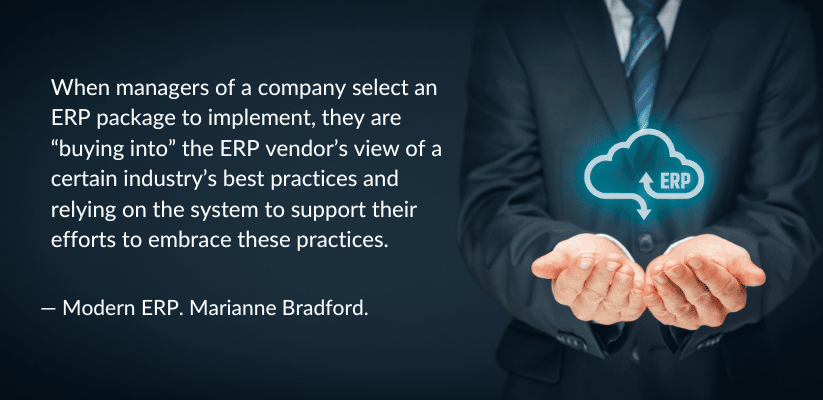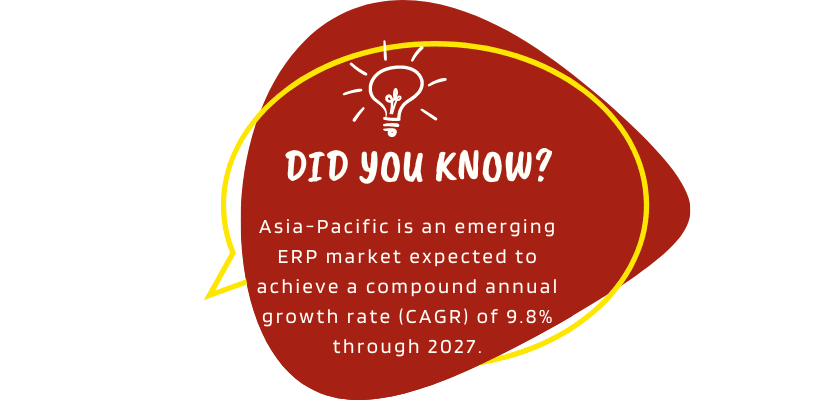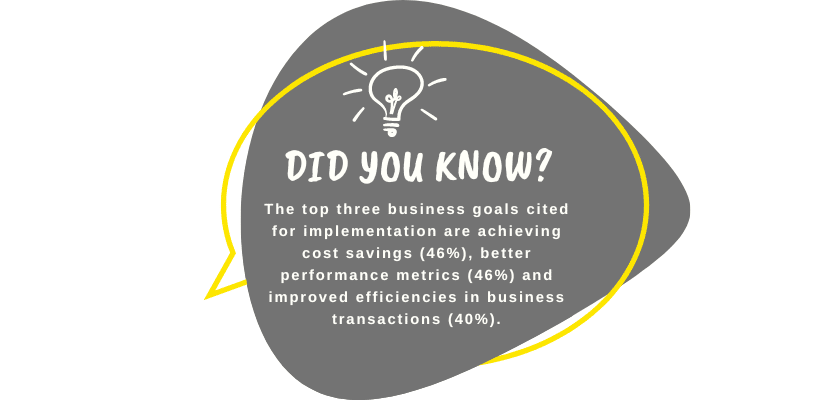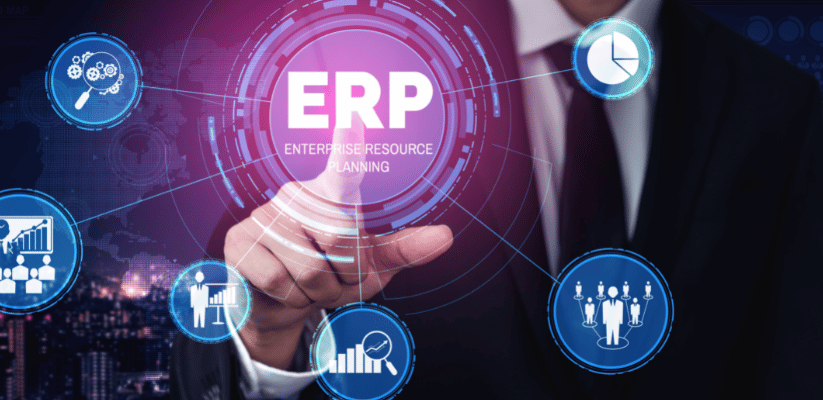Summary: A recent report by Allied Market Research reveals that the ERP market size will increase from USD 43.72 billion in 2020 to USD 117.09 billion by 2030. That’s an impressive growth of a CAGR of 10%. Nonetheless, multiple companies might wonder why the ERP market is growing by leaps and bounds. They need to understand that ERP software is essential in helping businesses increase efficiency, cut operational costs, build an outperforming team, and create robust and evergreen customer relationships. In short, ERP is important because it provides a competitive edge that helps transform a company into a market leader.

Benefits of ERP software: A short overview
Here are a few points that describe how ERP systems help organizations across industries to achieve their business goals:
- ERP is important because it stores critical information in a single platform allowing business stakeholders to access, create, edit, and share it with anyone, anytime, and through any device.
- You can customize ERP systems for your business based on your current needs. For example, a food and beverage company can opt for a recipe module. On the other hand, a shipping company can integrate a supply chain management module.
- Your company can save money by not purchasing modules you don’t need currently. It’s a good strategy for small and micro businesses that cannot afford to buy expensive business management solutions.
- You can create advanced reports to check the vitals of your business. These reports will provide a 360° overview of your company, including monthly sales, number of new/retained customers in a month, number of machine breakdowns, and employee performance.
Why ERP is important?
ERP software can manage multiple business functions efficiently, but what distinguishes it from other solutions? The importance of ERP can be measured by its distinctive appeal to provide the best services at relatively affordable prices. The following list provides 8 reasons why ERP is important for your organization and why you should consider implementing it.
1. Better collaboration
One of the most significant benefits of ERP software is improved collaboration between different business departments. Usually, traditional companies have data silos, which are information repositories that can be accessed only by a particular department. The problem is that it restricts different teams from accessing information instantly. But an ERP system destroys data silos by bringing all information repositories to a single platform. The benefits include —
- Department A doesn’t have to seek permission from department B before accessing critical data.
- A single source of truth reduces errors, decreases incorrect data, and eliminates data duplication.
- A central database allows stakeholders to access information from anywhere, anytime, and through any connected device.
- An ERP system ensures data is complete, accurate, and 100% safe from external threats.
2. Save your investments
Business management solutions have reduced their prices lately, enabling multiple companies to implement them and take advantage. But, ERP software is still considered to be a big-ticket purchase. So, if you look at an ERP system from a cost perspective, it might not appear to be a cost-saving proposition. To understand the real power of ERP software, you need to come out of the initial sticker shock.
Here’s how you can save money by implementing enterprise resource planning software in your business:
- ERP software unifies multiple information systems eliminating the need to implement fragmented solutions.
- Your employees can access all the necessary tools to perform their jobs on one platform.
- With enterprise resource planning (ERP), users don’t have to search for crucial information across multiple systems. They can draw valuable insights from data stored in a single integrated database.
- ERP is important as it automates repetitive tasks. Therefore, users don’t have to take rigorous training sessions to operate the ERP software.
- Your ERP vendor will take the update and maintain your ERP software. Therefore, you don’t need an IT team to do that.
<<<Also Read: Determining ERP Customization and Configuration Needs >>>
3. Enhance productivity
One of the most crucial benefits of Enterprise Resource Planning software is that it can perform tedious tasks. For example:
- Processing orders
- Monitoring inventory levels
- Creating general ledger
- Creating financial data models
- Creating invoices and quotes
- Helping with tax declarations and global compliances
- Help with credit management and payment process
- Packaging and labeling
- Managing the sales workflow
- Generating Bills of Materials (BoM)
- Automatic data collection (ADC) with handhelds
- Shop floor tracking
- Material weight management during the production process
- Product traceability
- Allows changes only by authorized and verified stakeholders
- Timesheet tracking
Companies can save massive costs by assigning the functions mentioned above to ERP software because by doing that:
- Employees can instead focus on mission-critical tasks.
- Human-induced errors will be eliminated.
- Redundant tasks like data entry can be performed quickly.
- Complex calculations can be done within seconds.

4. Comply with government rules
Governments across the globe and international institutions are tightening the rules and companies that don’t adhere to them are finding them on the receiving end. The world is awakening to new information security, environmental, and human resource regulations and customers show higher levels of trust and loyalty to companies that care more about the environment around them.
If your company is operating in an industry that requires you to comply with numerous compliances, then ERP is important for you. Modern ERP systems are built keeping in mind you need to comply with government norms at every stage. In addition, they have built-in tools that take care of multiple tax provisions and document business critical things like recipes for the F&B industry or chemical potency and usage for the chemical industry.
Moreover, ERP systems play a pivotal role in managing risk. They have an advanced financial management module that eliminates errors while generating accounting reports and maintaining the general ledger. Cutting-edge forecasting tools enable users to predict crucial events like labor, demand, and budget leading to better work scheduling, secure budgets, foolproof product development plans, and matching up with customer demands in the short and long term.
5. Forging robust and strong customer relationships
Irrespective of your product line and the segment you are offering your services to, forging one-to-one customer relationships is the need of the hour. Today, in the digital age, your customers know more about your company than you do. And if you fail to provide what they want, they won’t hesitate to switch to your competitor.
Moreover, do you know that 84% of customers trust the internet to search for what to wear, eat, and how to live their lives as much as they do their friends?
One of the best ways to enhance customer satisfaction is by providing client-focused services and products. This is where ERP is important for your business as it has an integrated Customer Relationships Management (CRM) module that serves the following functions:
- Recording multiple client requests simultaneously.
- Responding to repetitive questions quickly.
- Enabling client service employees to access client information from multiple databases.
- Decoding changing customer preferences.
- Generating and sharing invoices with customers instantly.
- Automate messages, notifications, and recommendations to users.
Do you know: It’s 5 times more expensive to find new customers than to retain the existing ones.
Moreover, CRM software also records other critical data points like billing information, order history, and past purchasing habits allowing decision makers to identify customers’ needs and wants and estimate what customers might want in the future. When you get access to critical customer details you can improve your sales strategy and improve lead generation.
6. Improved analytics
Decision makers require reliable data, comprehensive reports, and analytics to understand changing market conditions and customer preferences. ERP is important because it collects crucial information from multiple sources and enables the upper management to gain valuable insights from that data.
Here’s how ERP software helps:
- Generate error-free complex reports within seconds.
- Analyze employee performance in real time.
- Set custom KPIs like income, profits, and expense statements to gain a comprehensive perspective.
- You don’t require a highly qualified IT team to generate report and derive meaning out of them. The ERP software can do that quickly and efficiently.
- Reports have varied access levels. So, only authorized users can view them.

7. Enhanced Inventory Management
Is your inventory growing rapidly? How are you identifying the exact level of inventory you need? How are you tracking the real-time location of your finished products? This is why ERP is important because it uses RFID tags, barcoding, and serial numbers to track inventory at each stage of the supply chain. With such advanced tools, you can:
- Identify which items are being transported from source to destination.
- The quantity of raw materials across each warehouse.
- Which finished items are on the shelves and ready to be picked up by consumers.
Increased warehouse visibility enables companies to optimize their supply chain performance — pick, pack, and ship — and removes the guesswork. Users can also configure KPIs to check:
- Products that are moving fast showing greater demand.
- Products that increase carrying cost.
- Products that are selling slow.
ERP is important because it provides real-time data to warehouse managers enabling them to make precise business decisions.
8. Better shop floor management
Shop floor management upgrades production quality and efficiency. Today, with digitalization taking over each business aspect, identifying improvement potential across manufacturing operations is essential. And this is why ERP is important because it optimizes the entire shop floor operations giving more time to managers to focus on critical management tasks.
Here are the benefits of implementing ERP software for shop floor management:
- Automate BOM creation — Generate BOMs automatically. Eliminate the guesswork and make objective decisions.
- Eliminate errors — Acquire raw materials on time. Have the right materials on the shelf. Get accurate real-time reports of materials you have and those you need immediately.
- Identify shop floor issues immediately — Identify assembly line challenges and identify the manufacturing process progress each day.




